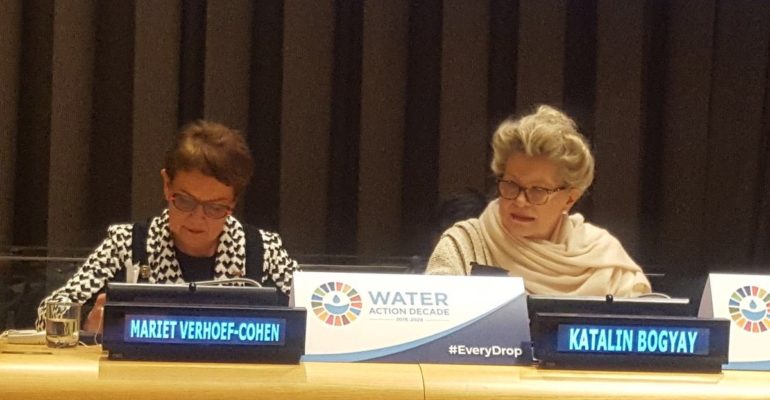On World Water Day, 22 March 2018, the International Decade for Action: Water for Sustainable Development 2018-2028 was launched at the United Nations. The Decade aims to further improve cooperation, partnership, and capacity development in response to the ambitious 2030 Agenda for Sustainable Development.
Following a presentation of a short video “Water’s Promise: Making every drop count”, opening remarks were given. H.E. Mr. Mahmoud Saikal, Permanent Representative of the Islamic Republic of Afghanistan to the United Nations and Vice President of the General Assembly, on behalf of H.E. Mr. Miroslav Lajčák, President of the 72nd Session of the UN General Assembly, spoke of the “need to face reality”. He said: “No one, working in this building, will go thirsty. None of us will wonder whether our next sip of water will make us ill. None of us will risk our dignity, or our safety, to meet our basic human needs. This, simply, is our reality. But, for too many people around the world, it is a different story”.

He added, “Water resources are in grave danger”. Speaking of the challenges brought by growth in the population and water-intensive economic activity, he said: “Rainfall patterns are changing – and not for the better. The damage we have done to the environment is affecting our climate, and intensifying water-related disasters – including famines, floods, and droughts”.
He went on to speak of a very “real danger”, of a growing competition for water and “the risk that this competition could turn violent, and result in conflict – and therefore more human suffering”.
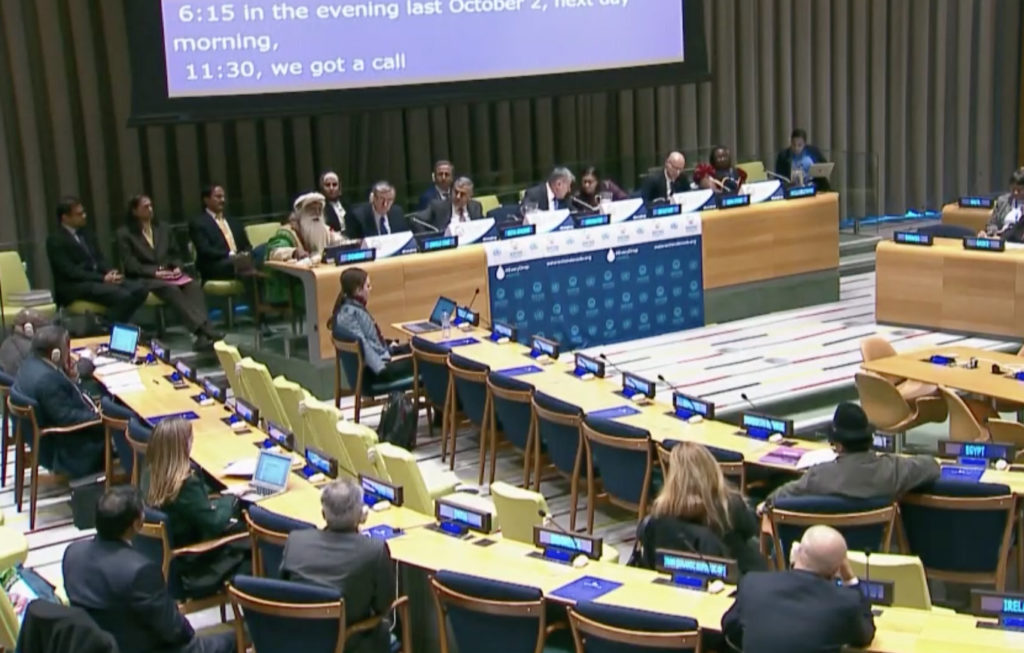
Photo: Panel 1
H.E. Mr. António Guterres, Secretary-General of the UN presenting the Action Plan of the International Decade for Action said: “We cannot continue to take water for granted and expect to achieve the Sustainable Development Goals. Solutions exist and new technologies are in the pipeline to improve how we manage water for nations, communities, and households. But often these solutions are inaccessible for those who need them most, perpetuating inequity within and among countries”.
Underlining the mission and principles of Soroptimist International, he said: “As with most development challenges, women and girls suffer disproportionately. For example, women and girls in low-income countries spend some 40 billion hours a year collecting water. That is equivalent to the annual effort of the entire workforce of a country like France. The time spent could be much better invested in earning a livelihood or – in the case of girls – attending school. It is time to change how we value and manage water”.
“We have come together, in this Hall, to confirm that all people have a human right to safe drinking water and sanitation” António Guterres.
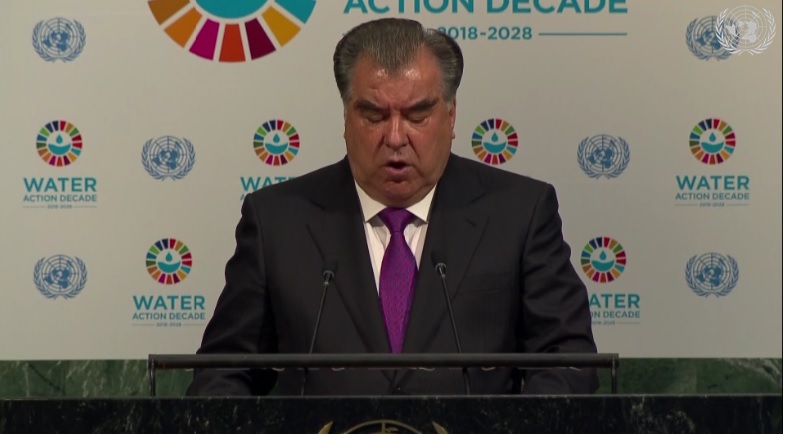
Photo: H.E. Mr. Emomali Rahmon, President of the Republic of Tajikistan
Further remarks were given by H.E. Mr. Emomali Rahmon, President of the Republic of Tajikistan, initiator of the International Decade for Action, presenting the report Making Every Drop Count: An Agenda on Water Action, on behalf of the members of the High-Level Panel on Water. This was followed by a speech by Miss Autumn Peltier, a thirteen-year-old Civil Society Representative who spoke of “Water being the lifeblood of mother earth” and “let’s not let water and mother earth down”.
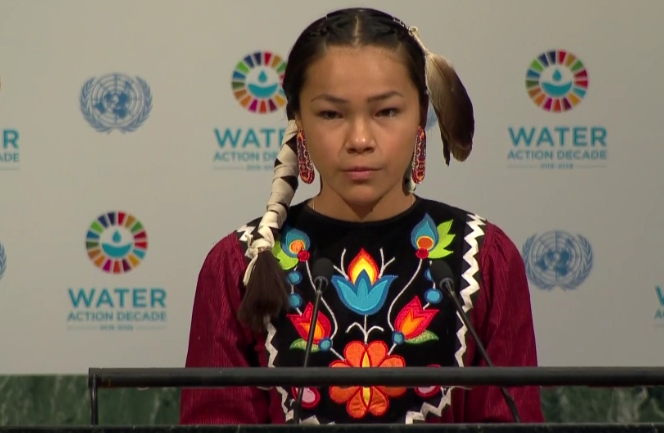
Photo: Miss Autumn Peltier
Panel One spoke on the Contribution of the Water Decade to the implementation of water-related SDGs: Addressing challenges and seizing opportunities through strengthening cooperation and partnerships. Later in the day SI President and President of Women for Water Partnership, Mariet Verhoef-Cohen joined Panel 2 – the role of relevant stakeholders in mobilizing necessary resources for the implementation and follow up of water-related SDGs.
Mariet spoke of the “urgency to make use of the enormous resource of experienced women”, acknowledging and supporting women’s capacity at all levels, challenging social norms and stereotypes in order to achieve this. Mariet pushed for a UN International Year of Water and Women – to signify and provide an opportunity to show “that we are practising what we have preached since the Dublin Principles” and “to emphasise the positive role of women, in water projects, in innovation, and in the more efficient use of scarce resources, helping us make greater strides to achieving equal access to water and sanitation for all”.
“Men and women must participate on equal footing in water programmes”. Mariet Verhoef-Cohen.
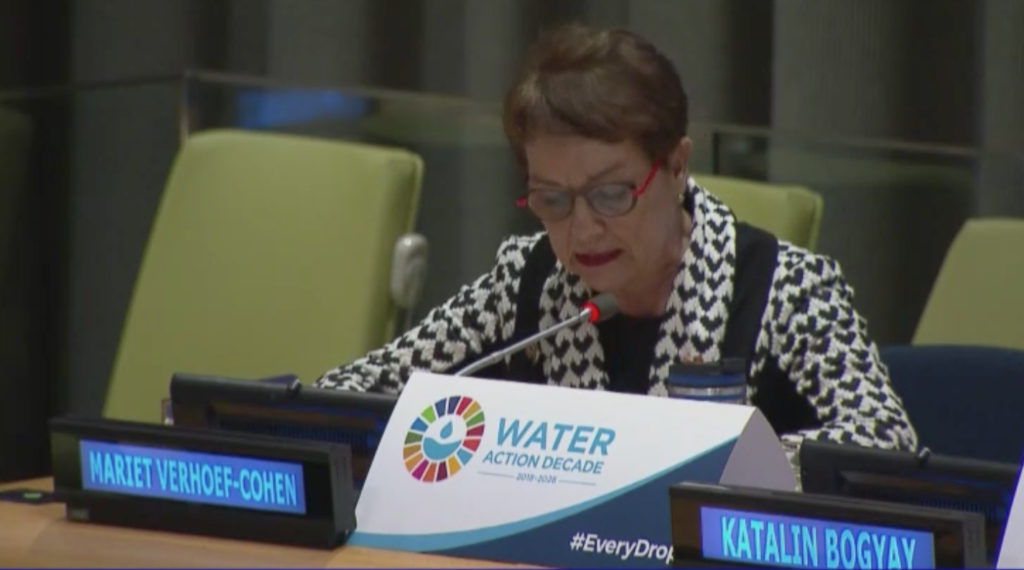
Photo: SI President and President of Women for Water, Mariet Verhoef-Cohen
In a statement given by the President of the 72nd Session of the UN General Assembly, at the closing of the launch event of the International Decade for Action: Water for Sustainable Development 2018-2028, H.E. Mr. Miroslav Lajčák, spoke of the many messages delivered during the launch. Of water scarcity, of the link between water and human suffering “a real – and sobering – indication of our current state of play”. He stated statistics such as 2 billion people drink contaminated water, and one child dying every minute from the effects of this.
With 90% of all natural disasters in the world being water-related and eco-systems under pressure, there were, of course, messages of hope – pioneering and creative methods, looking outside the box, the use of education as a tool for water conversation, technical innovation, and the sharing of scientific knowledge on water.
“We are, really, at the precipice of disaster. While we are starting to slow ourselves down, we are still far from safety”.
As suggested by speakers – this must not be a decade of talking – it must be a Decade of Action.

